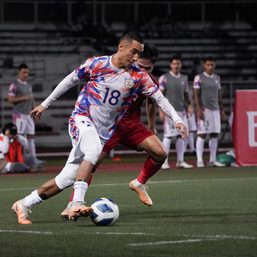SUMMARY
This is AI generated summarization, which may have errors. For context, always refer to the full article.

MANILA, Philippines – National women’s football team player Quinley Quezada suddenly had heads turned towards her during a train ride while she was on a video call with her friends from the US.
Moments later, an announcement flashed on the screen: “Passengers should refrain from talking.”
This is just one of the experiences of FIFA Women’s World Cup-bound players Quezada and Sarina Bolden off the field as they pursue their professional dreams in the inaugural Women Empowerment (WE) League in Japan.
As Japan joins the global movement to grow women’s football, Quezada and Bolden are grateful to take part in a rare opportunity to play professionally.
“I think just being able to compete at such a high level, I really don’t take that for granted because I know there’s a lot of girls my age that don’t have this opportunity,” said Bolden, who scored the last penalty kick that sent Philippines to the World Cup.
“It’s really hard for women to go on and play professional soccer, so this opportunity is everything to me, and it’s taken me a long time [to get here].”
Despite needing to adjust to a high-context culture society such as Japan, both US-born players find it to be a joyous learning process in their careers.
Settling in
In order to cope with their day-to-day activities, Bolden and Quezada had to overcome the language barrier in Japan as many locals do not speak English. The coaches and their teammates also communicate in Japanese in training.
JEF United Chiba, Quezada’s club, came prepared for her adjustment and hired a tutor and a translator to help her. Her teammates also make the effort to translate instructions to her.
“I feel like it’s a challenge every day, but my teammates help me and thankfully my club got me a tutor, so I’m trying to practice my Japanese,” shared midfielder Quezada.
For Bolden, her club Chifure AS Elfen Saitama provides her with a translator to go around with her outside practice. But she exerts her own effort to learn the language by watching Youtube videos.
“Outside of the soccer field, I have a translator. So if I catch him, he translates for me,” said Bolden.
“But I would say a lot of the times I am kind of figuring things out on my own, which is totally fine. I’m up for a challenge and it helps you grow as a person when you don’t understand what’s going on.”
Living in the cities near Tokyo – Chiba and Saitama – Quezada admitted that she was initially overwhelmed by the capital’s train system in addition to her blooper moment with her friends. Chiba, though, provided her with a bike.
“They gave me a bike and my practice field is not far from here. So I just bike to practice and to the grocery store, whatever I need. But using the train and everything, it took me a while to get used to,” said Quezada.
The two Filipino-Americans also encountered culture shocks in the field.
Game-wise, both Quezada and Bolden agreed that the Japanese are more technical with their plays while the Western style of football they grew up in was more physical. Bolden, who played for a Swedish club in a semi-professional level, said that the rigor of Japanese football further sharpened her individual skills.
“Organization is everything. If you aren’t in line with a certain formation that we have, and you’re out just a little bit, my teammates would be like: ‘No, get over here, we need to be like this and you need to stay organized’,” shared Bolden.
“It’s back to the basics of how important those little details are. And sometimes you overlook them because you’re just kind of doing things day in and day out and you forget to think about so. So that really sharpened my game.”
Feeling at home
Quezada and Bolden are also recipients of Japanese hospitality and thoughtfulness.
During the AFC Asian Cup in India, the members of Chiba and Saitama made sure to catch the Filipinas’ games and watched Philippines qualify for a historic World Cup berth in the thrilling game against Chinese-Taipei.
Bolden recalled that her team surprised her at the airport and her coach showed her pictures of the team watching her games from the livestream.
“When I finally got to the terminal and everything, one of the coaches picked me up and he brought me flowers, and was like: ‘Congratulations! This is from the team. What a job well done’. So that was really nice and I really appreciated it,” shared Bolden.
“The Japanese, in my opinion and what I’ve noticed, are really good gift givers. They’re very considerate and thoughtful, and they’re really good at giving.”
Quezada shared that her team takes part in community efforts and she gets to see how her teammates teach elementary school students how to play football.
“I think it’s really cool too because it’s like we’re bringing other people into our soccer community,” said Quezada. “They are little kids and they come after their recess, and they have their notebooks asking us, ‘Can you sign?’ So cute!”
Filipinos living in Japan have also come out to support Quezada and Bolden.
The WE League was heavily hit by the pandemic and restricted players from interacting with fans, but both players feel the impact of the supportive efforts of their countrymen.
“There was one game and I think this is the game that actually got my first assist. They put up the Filipino flag in the stands,” shared Bolden.
“I thought it was so nice. So sweet. Then I think it had an impact on me because I made assists, and it was like our first win of the season.” – Rappler.com
Add a comment
How does this make you feel?





There are no comments yet. Add your comment to start the conversation.